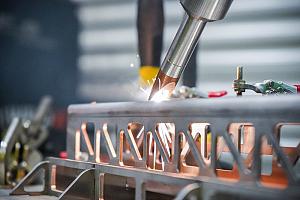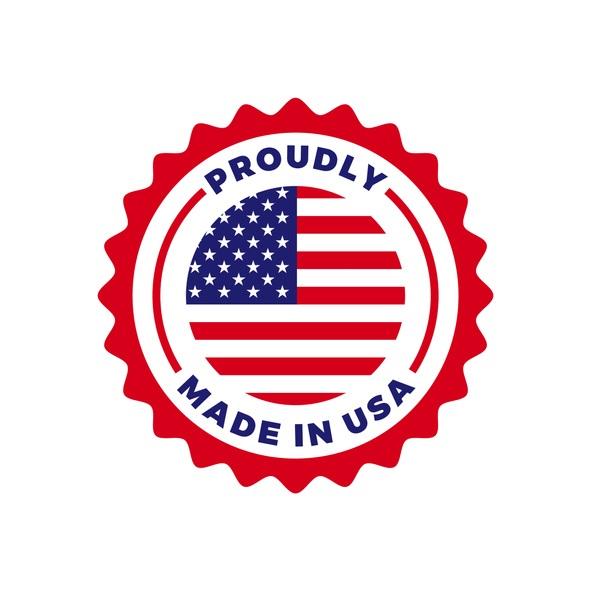Contributing editor
- FMA
- The Fabricator
- FABTECH
- Canadian Metalworking
Categories
- Additive Manufacturing
- Aluminum Welding
- Arc Welding
- Assembly and Joining
- Automation and Robotics
- Bending and Forming
- Consumables
- Cutting and Weld Prep
- Electric Vehicles
- En Español
- Finishing
- Hydroforming
- Laser Cutting
- Laser Welding
- Machining
- Manufacturing Software
- Materials Handling
- Metals/Materials
- Oxyfuel Cutting
- Plasma Cutting
- Power Tools
- Punching and Other Holemaking
- Roll Forming
- Safety
- Sawing
- Shearing
- Shop Management
- Testing and Measuring
- Tube and Pipe Fabrication
- Tube and Pipe Production
- Waterjet Cutting
Industry Directory
Webcasts
Podcasts
FAB 40
Advertise
Subscribe
Account Login
Search
President Biden’s "Made in America" order will help U.S. manufacturers
Closes loopholes, ups content share, provides transparency with strengthened Buy American rules
- By Kate Bachman
- March 29, 2021
The Buy American executive order that President Biden signed on Jan. 25 will benefit U.S. stamping manufacturers and metal fabricators supplying the federal government, despite the requirement that the materials they purchase be produced domestically as well. By strengthening existing Buy American rules, the order is positioned to boost U.S. manufacturing because it requires preference to domestic producers and removes much of the price suppression that accompanies global cost competition.
Although the Buy American order applies only to federal government spending, that pot is sizable--$600 billion--and applies to everything from military contracts and postal and other federal vehicles to construction components for federal facilities.
The order, another in a long line of “adjustments” to the 1933 Buy American Act that directs government spending to procure a majority of materials and products from U.S. sources, includes significant improvements over previous iterations. It does so by redefining “U.S. content,” pressing to increase the content percentage, closing loopholes in the waiver process, and providing oversight and accountability.
According to the U.S. Government Accountability Office (GAO), “Problems in administering the act involve definitions of ‘substantially all’ of the components and definitions of ‘manufactured in the United States.’” Additional snags have been in the “public interest” waiver: “The provisions of the act may be waived if the head of the procuring agency determines the act to be inconsistent with the public interest or the cost of acquiring the domestic product is unreasonable.”
The executive order creates a new position in the Office of Management and Budget and imposes scrutiny of the waiver process that has been abused in the past.
“The percentage of Defense Department contracts receiving waivers … jumped under Trump. Such waivers are a key target of Biden’s executive order,” according to a Jan. 27 Washington Post article.
“Biden’s ‘Buy American’ plan will make it more difficult for federal agencies to contract with companies overseas to purchase foreign products by reducing loopholes and waivers in existing Buy American rules and changing the definition of ‘American-made’ goods,” according to a Forbes article, “Biden Signs ‘Buy American’ Executive Order—Here’s What It Means For Businesses.”
Additional good news for stampers and fab shops is a provision for small and midsize businesses to give them better access to information about contracting with the federal government and competitors’ waivers. Stampers and fabricators have a better chance of having a seat at the government contracts table.
Consumers Versus Makers
The American-made requirement resurfaces the age-old arguments about whether or not protectionism—required preference for nationally manufactured products—is good for Americans and the U.S. economy. Free trade arguments enter in.
Global competition reduces the price consumers have to pay for goods produced. Low-cost, foreign-produced goods threaten the survival of U.S. manufacturers—which are also employers.
That conundrum has existed for decades, as the U.S. trade surplus has eroded since NAFTA. The U.S. trade deficit is a stark marker of the result of manufacturing migration.
Charles Fishman’s 2003 Fast Company article “The Wal-Mart You Don’t Know” revealed in painful detail how U.S. shoppers buying China-manufactured goods at Walmart—then the U.S.’s largest importer of products from China—unwittingly hastened the demise of their own factory jobs.
So, what’s the better trade-off—being able to buy inexpensive products but losing manufacturing jobs and revenue, or buying more expensive goods and maintaining a healthy manufacturing industry in the U.S.?
Balance Is Key
I suspect that stamping manufacturers concede that at least the U.S. government should be required to buy U.S.-manufactured products, whether for military operations and national security, postal services, or offices of administration. And who wants American flags to be made in China?
The key is to ensure that the price that U.S. manufacturers pay to manufacture products doesn’t exceed the financial benefits of supplying them.
Got thoughts? Email me. I'd love to hear from you.
subscribe now

The Fabricator is North America's leading magazine for the metal forming and fabricating industry. The magazine delivers the news, technical articles, and case histories that enable fabricators to do their jobs more efficiently. The Fabricator has served the industry since 1970.
start your free subscriptionAbout the Author

Kate Bachman
815-381-1302
Kate Bachman is a contributing editor for The FABRICATOR editor. Bachman has more than 20 years of experience as a writer and editor in the manufacturing and other industries.
- Stay connected from anywhere

Easily access valuable industry resources now with full access to the digital edition of The Fabricator.

Easily access valuable industry resources now with full access to the digital edition of The Welder.

Easily access valuable industry resources now with full access to the digital edition of The Tube and Pipe Journal.
- Podcasting
- Podcast:
- The Fabricator Podcast
- Published:
- 04/30/2024
- Running Time:
- 53:00
Seth Feldman of Iowa-based Wertzbaugher Services joins The Fabricator Podcast to offer his take as a Gen Zer...
- Trending Articles
JM Steel triples capacity for solar energy projects at Pennsylvania facility

Fabricating favorite childhood memories

How laser and TIG welding coexist in the modern job shop

Robotic welding sets up small-batch manufacturer for future growth

Ultra Tool and Manufacturing adds 2D laser system

- Industry Events
Pipe and Tube Conference
- May 21 - 22, 2024
- Omaha, NE
World-Class Roll Forming Workshop
- June 5 - 6, 2024
- Louisville, KY
Advanced Laser Application Workshop
- June 25 - 27, 2024
- Novi, MI
Precision Press Brake Certificate Course
- July 31 - August 1, 2024
- Elgin,




























